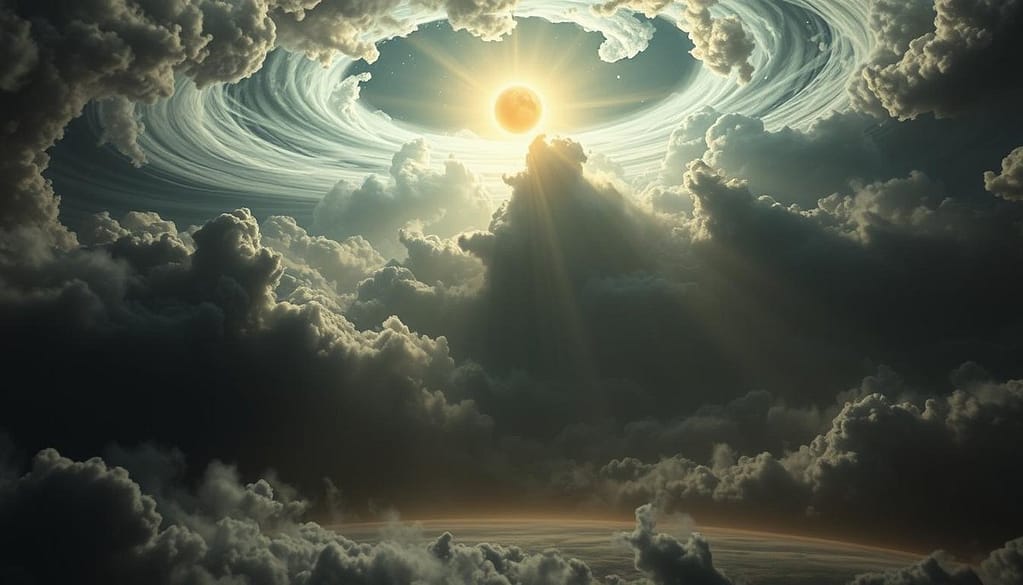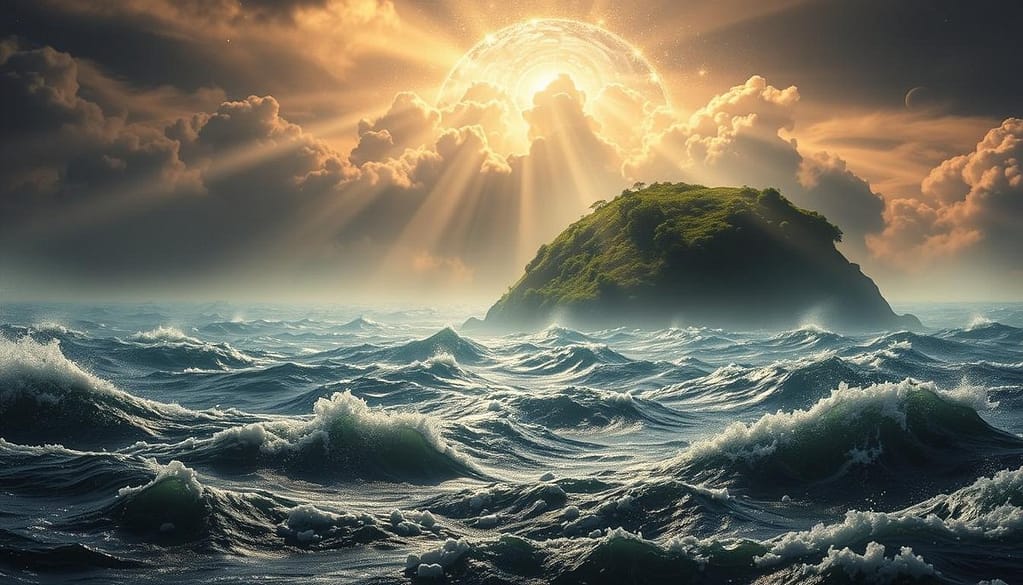Genesis Unlocked: Discover the Bible’s First Story of Creation
Genesis Unlocked: Starting your journey to understand the Bible’s first story of creation is exciting.
You’ll dive into a tale that has sparked many debates. This story is a symbolic start to the Bible, seen from God’s view on earth.
To grasp this tale, knowing the cultural and language background is key. It shows what existed on earth, not the whole universe.
This insight is vital for unlocking the biblical creation story. It shows how the earth’s history, as told in the Bible, matches scientific facts.
Exploring the biblical creation deepens your understanding of our origins. It’s a key part of discovering the Bible’s first story of creation.
As you explore Genesis Unlocked, the creation story will reveal its beauty and importance in a new way. Your journey will be unforgettable.
The Significance of Genesis Unlocked in Understanding Our Origins
Exploring the Genesis account reveals the Bible’s creation story. It gives us insights into the world’s origin. This story is more than just a tale from the past. It shapes our view of the world and our role in it.
The Bible’s creation story is key to understanding the biblical worldview. It has greatly influenced human thought over time.
The Genesis account tells us God made everything perfect, and we are created in His image. This message remains central, despite different views on creation.
Some important points to think about when studying Genesis include:
- The Genesis creation story is a prologue to the rest of the Bible
- The story of creation has implications for our understanding of the world and our place in it
- The Genesis account is essential in understanding the biblical worldview
By looking into the Genesis account and the Bible’s creation story, we gain insight into the world’s origin and our role. This understanding helps us see the importance of Genesis in our lives today.
Before Time Began: Setting the Stage for Creation
When you explore the biblical Genesis, you find two main parts. Chapters 1-11 tell the story of creation and the world’s early history.
Chapters 12-50 focus on Abraham’s call and his family’s stories. This creation tale is more than just history. It shapes our view of God and our connection to him.
In the biblical Genesis, time is key. Genesis 1:1 says time started with the creation of the heavens and earth. This means nothing existed before Genesis 1:1. It suggests God created space and time at the same moment.
Some important points about the Bible’s creation story are:
- Time lets things change and grow.
- Without time, things like ants or people can’t change form. No time means no change.
- Stars form when gas and dust clouds collapse. This takes at least 210,000 years.

The biblical Genesis tells us about creation. It’s vital for grasping the Bible’s creation story. As you dive into the narrative, you’ll see the creation story is more than history.
It shapes our view of God and our relationship with him. The Bible’s creation story is rich and has been seen in many ways over time.
The Divine Speaking: “Let There Be Light”
Exploring the creation of the universe makes us curious about the world’s origin. The biblical account in Genesis 1 tells us about the earth’s surface, not the whole universe. It gives us a special view of how the world began.
The first words, “Let there be light,” start the creation story. This moment is key, as it leads to the rest of the story. Light and darkness symbolize good vs. evil.
From a scientific view, the universe’s start is complex. Yet, the Bible offers a unique take on creation.
Understanding Day One
On the first day, God split light from darkness, creating day and night. This event is vital for understanding the universe’s creation. It shows the start of good vs. evil and sets the stage for more.
The Symbolism of Light and Darkness
Light and darkness symbolize good and evil in the Bible. Light stands for goodness and wisdom, while darkness is evil and chaos.
The first day’s light and darkness split shows the eternal battle between good and evil.
Scientific Perspectives on Cosmic Origins
The universe’s origin is a complex topic in science. The Big Bang theory is widely accepted, but many questions remain. The Bible offers a unique view, based on God’s power and his bond with humans.
| Theory | Description |
|---|---|
| Big Bang | The most widely accepted theory of the origin of the universe |
| Biblical Account | A unique perspective on the origin of the world, rooted in the idea of God’s creative power |
Forming the World: Waters, Land, and Vegetation
Exploring the biblical creation story, we see the world’s formation is key. The Genesis account tells us about the waters’ separation, land creation, and plant growth.
This part of the story is vital, setting the stage for our understanding of nature and our role in it.
The Genesis account details creation’s steps. It shows the waters’ separation, land formation, and plant creation.
Then, it moves to the sun, moon, and stars’ creation, and ends with animals and humans. The biblical creation story offers a unique view of the world’s start, stressing the natural world’s importance and our place in it.
Important points in the Genesis account include:
- The separation of the waters and the formation of the land
- The creation of vegetation and the formation of the natural world
- The creation of the sun, moon, and stars
- The creation of animals and humans

The biblical creation story is rich and complex, with many interpretations over time. As we dive deeper into the Genesis account, we’ll uncover more about its significance and how it relates to our world today.
The Celestial Dance: Sun, Moon, and Stars
The biblical Genesis tells us how the universe began, including the sun, moon, and stars. It shows how these bodies dance in the sky, a key part of the creation story.
The fourth day of creation is when the sun, moon, and stars were made. This event is important because it helps us measure time and understand the universe.
Understanding the Fourth Day
The fourth day is a big moment in the creation story. It sets the stage for life on Earth. The sun, moon, and stars were made to give us light and mark seasons and festivals.
Ancient Understanding vs. Modern Astronomy
Back then, people saw the sun, moon, and stars as signs and omens. Now, we know they are part of a huge universe ruled by laws.
Here are some key differences between ancient and modern understanding of the celestial bodies:
- Ancient understanding: The celestial bodies were seen as signs and omens.
- Modern understanding: The celestial bodies are part of a vast universe governed by physical laws.
Timekeeping in Creation
The sun, moon, and stars help us keep track of time. The biblical creation story gives us a special view of the universe and time.
The story of creation is deeply connected to time and the universe. The making of the sun, moon, and stars is key. It helps us measure time and understand the universe.
The Genesis creation story is rich and complex. It offers a unique view of the universe’s start. The dance of the sun, moon, and stars is a big part of this story. It helps us understand the universe and our place in it.
Life Emerges: Sea Creatures and Birds
As we dive into the Bible creation narrative, we find an exciting tale of life’s start. The biblical story tells us that God made sea creatures and birds on the fifth day. This was the beginning of life in the oceans and skies.
This event in the Bible creation narrative shows the variety and complexity of life. From simple to complex, God’s creation is a marvel. The creation of sea creatures and birds shows God’s power and wisdom.
Some key points about the creation of sea creatures and birds include:
- They were created on the fifth day of creation, according to the biblical account.
- Sea creatures and birds were blessed by God to multiply and fill the oceans and skies.
- The creation of sea creatures and birds marks the beginning of life on earth, and is an essential part of the Bible creation narrative and the origin of the world.

The story of life’s emergence is both fascinating and complex. It’s a key part of the Bible creation narrative and our understanding of the origin of the world.
By exploring this story, we can appreciate the beauty and diversity of life. We also see God’s power and wisdom in creating the world and all its creatures.
| Day of Creation | Creation Event |
|---|---|
| Day 1 | God created light |
| Day 2 | The firmament was created to separate waters |
| Day 3 | Dry land appeared, and plants were created |
| Day 4 | Celestial bodies were created to mark time and distribute light |
| Day 5 | Sea creatures and birds were created |
The Crown of Creation: Humankind’s Arrival
As we dive into the biblical creation story, we reach its peak: the arrival of humans. The story of the universe’s creation is complex. The biblical account gives us a special view on this event.
Humans were made in God’s image, marking the end of the creation story. This idea is key to understanding who we are and our role in the world.
The creation of the universe and the biblical account are closely linked. They help us understand God’s relationship with us and the world.
The importance of human creation is clear in several ways:
- Humans are unique because we were made in God’s image.
- Our creation is the highlight of the story, showing our importance in the universe.
- The biblical account helps us understand human nature and our place in the world.
In the story of the universe’s creation, the biblical account offers a special view on human life’s origin and purpose.
By exploring the biblical creation story, we learn about God and our role in the world. The creation of the universe is a deep topic. The biblical account is a vital part of this story.
The Seventh Day: Understanding Sacred Rest
Exploring the biblical Genesis reveals the seventh day’s importance. It marks creation’s end and sets a work and rest pattern.
The seventh day is a day of rest, where God stopped working. It’s not just a break but a time for worship and thinking. The Sabbath, a holy day, is when God rested on the seventh day.
Some key aspects of the Sabbath include:
- It’s a day of rest, where no work is done
- It’s a day of worship, where people come together to worship God
- It’s a day of reflection, where people reflect on God’s creation and their place in it
The Sabbath idea isn’t just in Genesis. It’s also in other parts of the Bible. For example, in Exodus 20:8-11, God tells the Israelites to keep the Sabbath holy.
The Sabbath is also a symbol of God’s rest and a blessing for humanity in prophetic writings.
| Aspect of the Sabbath | Description |
|---|---|
| Rest | A day where no work is done |
| Worship | A day where people come together to worship God |
| Reflection | A day where people reflect on God’s creation and their place in it |
As you dive deeper into the biblical Genesis and the creation story, you’ll understand the seventh day and Sabbath better. The Sabbath is more than rest; it’s a day for worship and reflection. It’s a key part of the biblical narrative.
Modern Interpretations and Scientific Dialogue
When you think about the creation of the universe, you might ask how modern views and scientific talks relate to the Bible.
The start of the world is a big topic with many views from science and faith.
Some interesting facts about the Bible’s creation story include the number seven. It means perfection and completion. For instance, Genesis 1:1 has seven words and 28 letters. Genesis 1:2 has 14 words.
The word “Elohim” is used 35 times. Phrases like “and it was so” and “God saw that it was good” each happen 7 times.
Here are some key points to consider when exploring modern interpretations and scientific dialogue:
- The creation story happens over six days, ending with a seventh day of rest.
- Different Bible translations disagree on where to put section breaks, like around Genesis 2:4a.
- Important thinkers like St. Augustine lived long before Darwin. He didn’t believe in a young earth.
Looking at how modern views and science talk about creation helps us understand the universe and the world’s start. This can make us see the Bible’s story in a new light.
| Topic | Description |
|---|---|
| Genesis 1 | Seen as a philosophical poem, not a science text |
| Podcast episodes | Go deep into faith and spirituality, with guests like Matthew Distefano |
| Scriptural passages | Focus on general revelation’s importance, with examples from Psalm 19:1 and Romans 1:19-20 |
Conclusion: The Eternal Impact of Genesis’s Creation Story
The biblical creation story in Genesis has deeply influenced our view of the world. It tells us about the universe’s start and our role as God’s creations. This story is the first story of creation in the Bible.
This account is not just a historical tale. It sets the stage for the Bible’s story, showing our connection to God and our duty to care for His world.
Through it, we see how this creation story has shaped our views on God, science, and humanity for centuries.
Looking at Genesis through faith, science, or both, it’s a compelling story of our beginnings and purpose. May the eternal impact of this biblical creation story guide you to a deeper love and understanding of God’s creation.
FAQ
What is the Genesis creation story?
The Genesis creation story is a fascinating tale from the Bible. It tells us how the world began. It’s in the first chapters of Genesis, the Bible’s first book.
Why is the Genesis creation story significant in understanding our origins?
This story is key because it lays the groundwork for the Bible’s story. It helps us see the world and our role in it. It shows God’s power and his bond with us.
How is the Genesis creation story structured?
It’s split into two parts. Chapters 1-11 cover creation and the world’s early history. The rest of the book tells of the patriarchs and Israel’s start.
What is the significance of the first day of creation in the Genesis account?
The first day is important. It starts with God saying, “Let there be light.” This sets the stage for the rest of the story. Light and darkness symbolize good vs. evil.
How does the Genesis creation story describe the formation of the world?
It talks about separating waters, making land, and growing plants. This part is key. It helps us understand the natural world and our place in it.
What is the significance of the celestial bodies in the Genesis creation story?
The sun, moon, and stars’ creation on the fourth day is significant. They help us understand time. But, we must consider the ancient views of these bodies.
How does the Genesis creation story describe the emergence of life?
It tells of sea creatures and birds coming to life. This marks the start of life on earth. It’s vital for understanding our world and our role in it.
What is the significance of the creation of humanity in the Genesis account?
Humanity’s creation, made in God’s image, is key. It sets the stage for understanding human nature and our place in the world.
What is the significance of the seventh day of creation in the Genesis story?
The seventh day, a day of rest, is important. It shows the value of rest and worship. This pattern of work and rest shapes our understanding of ourselves and our world.
How do modern interpretations and scientific dialogue inform our understanding of the Genesis creation story?
Today, we see the Genesis story in new ways. Science and interpretation offer insights into the universe’s origin. The story’s meaning for our world and our place in it is ongoing.







